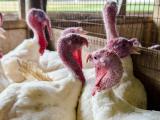Feb 9, 2012
NAS's 2004 call for research oversight remains largely unfulfilled
The controversy over lab-created H5N1 viruses and reassortants with increased transmissibility in ferrets shows that recommendations made in 2004 by the National Academy of Sciences on oversight of potentially dangerous biological research have gone largely unfulfilled, two Johns Hopkins University experts say in an article today in Science. The Fink report, as it is called, advocated a new system of oversight and biosecurity risk management for the life sciences, notes the article by Ruth R. Faden, a bioethicist and member of the panel that wrote the Fink report, and Ruth A. Karron, a professor of international health. The Fink report led to the establishment of the National Science Advisory Board for Biosecurity (NSABB), which recommended in December that details of two studies involving a mutant H5N1 virus and an H5N1-H1N1 hybrid be withheld from publication. Despite the creation of the NSABB, "no coordinated
system for oversight of dual-use research, either national or international, has been implemented" in the 8 years since the report was published, Faden and Karron write. They argue that an adequate assessment of the risks of dual-use research requires review by an international body with appropriate expertise. They conclude, "There is no doubt that there are formidable obstacles to developing such a global oversight body. But that the challenge is hard is no excuse. What we could not accomplish between 2004 and today can no longer be delayed."
Feb 9 Science Policy Forum abstract
VA opens comments on pandemic ethics guidance
The US Department of Veterans Affairs (VA) yesterday opened a public comment period on a draft of its pandemic planning ethics guidance. The VA produced the draft guidance after the White House asked it and other federal agencies, as part of a national pandemic influenza strategy, to develop guidance for allocating scarce resources. The VA said in a statement on its Web site that it has been using the draft version for planning and exercises. The 75-page document was produced by the VA's National Center for Ethics in Health Care. Though the VA said there's not currently an urgent need for the guidance, it said it is relevant to all-hazards emergency planning. The deadline for comments is Apr 9.
VA pandemic planning ethics report and comment portal
Vietnam reports 3 H5N1 outbreaks in birds
Vietnamese officials have confirmed three recent outbreaks of highly pathogenic H5N1 avian flu that killed 935 poultry and led to culling of 1,245 in two provinces, according to a report filed with the World Organization for Animal Health (OIE). The first outbreak began Jan 29 in Quang Tri province and killed 100 birds. Officials culled the remaining 200 birds to prevent disease spread. The second outbreak, also in Quang Tri in central Vietnam, began Feb 3 and involved 400 dead birds and the culling of 600 more. The third outbreak, in Thanh Hoa province in the north, began Feb 4, proved lethal to 435 birds, and led to 445 more being destroyed. Officials did not list a resolution date for any of the outbreaks. H5N1 was confirmed in the outbreaks by the national laboratory.
Feb 8 OIE report



















